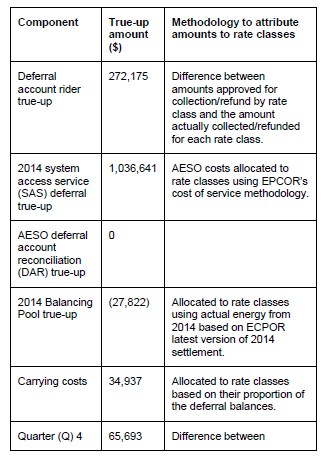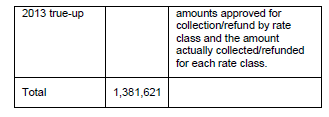Deferral Account True-up
EPCOR Distribution & Transmission Inc. (“EPCOR”) applied to the AUC for approval of its 2014 transmission access charge deferral accounts (“TACDA”) true-up, which it proposed to collect through Rider J. Each electric distribution company is charged by the Alberta Electric System Operator (“AESO”) for transmission services in relation to customers in their distribution service areas. EPCOR’s TACDA collects these charges as a flow-through of the AESO’s tariff charges during its performance based regulation term.
EPCOR submitted that pursuant to section 14(3) of the Electric Utilities Act, the AESO must be managed so that no profit or loss results from its operation on an annual basis, thereby necessitating the current application to true-up these amounts.
Among the items requested for collection in the proceeding, EPCOR requested the recovery of the following:
EPCOR proposed to collect its TACDA true-up and Q4 2013 true-up amounts through Rider J, effective from April 1, 2016 to June 30, 2016. EPCOR also requested approval for the extension of the annual deadline to file its TACDA true-up application from August 10 to August 17 each year.
The AUC accepted each of EPCOR’s calculations as filed, noting that the cost allocation methodologies were reasonable, or were previously approved by the AUC in prior decisions. The AUC therefore approved a net collection of $1,381,621 to be collected by EPCOR through Rider J.
With respect to the implementation period for the collection of the TACDA, EPCOR requested that the collection period begin in April of 2016 rather than in January of 2016, as it originally expected an approval of Q1 2016 for the current proceeding. However, EPCOR submitted that given the new timing possibilities, it would prefer a collection period starting on January 1, 2016, as the collection period would coincide with Rider DJ, which is a net refund, and would therefore reduce customer bill impacts. EPCOR submitted that a three-month collection period would result in a maximum change to customers’ monthly bills of 9.27 percent, and would therefore not constitute a rate shock.
The AUC agreed with EPCOR’s submissions, holding that coordinating the collection period of Rider J with Rider DJ would reduce the total bill impact for consumers, and noted that the proposed three-month collection period would not result in rate shock.
With respect to the deadline extension for the annual application of its TACDA, EPCOR submitted that a one-week extension to August 17 would allow enough time for EPCOR to incorporate final revenue information from the second quarter of the current fiscal year, thereby eliminating the need for future true-up applications for those quarters.
The AUC approved EPCOR’s request for an extension to the deadline for TACDA filings, holding that such an extension may create efficiencies.
The AUC therefore directed EPCOR to recover $1,381,621 through Rider J to be effective from January 1, 2016 to March 31, 2016.





